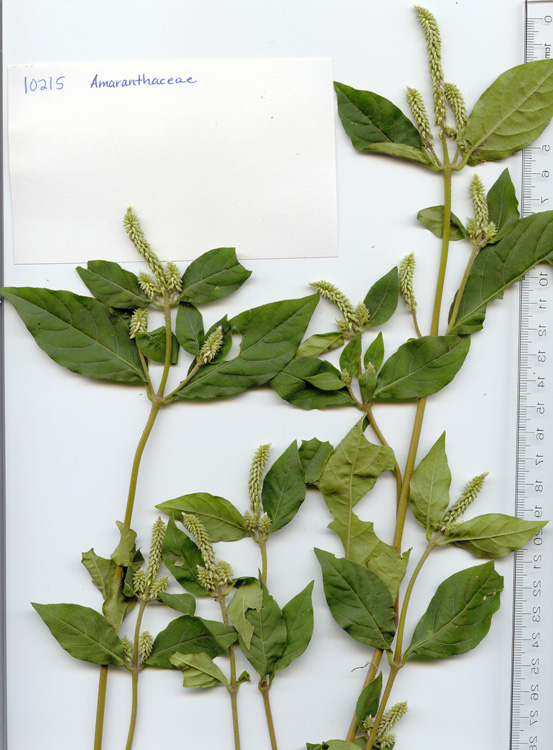Achyranthes
|
Family: Amaranthaceae |
Herbs, perennial or annual. Stems erect to ascending. Leaves opposite, petiolate; blade elliptic, ovate to orbiculate, or broadly rhombate, margins entire. Inflorescences terminal and axillary, pedunculate, elongate, many-flowered, simple spikes or few-branched panicles; flowers crowded together at tips, becoming more widely spaced toward base. Flowers bisexual, often becoming deflexed with age; tepals 4 or 5, basally connate, without ornamentation, coriaceous, becoming indurate in fruit, ± glabrous; filaments basally connate into short tubes or cups; anthers 4-locular; pseudostaminodes 5; ovary obovoid or turbinate; ovule 1; style elongate; stigma 1, capitate. Utricles enclosed by and falling with indurate tepals, elliptic or cylindric, membranous, indehiscent. Seeds 1, inverted, obovoid or ovoid, smooth. The groups of plants referred to as Achyranthes and Alternanthera have been subject to considerable nomenclatural confusion, primarily because P. C. Standley (1915) designated Achyranthes repens Linnaeus as the lectotype species of Achyranthes. As a result, species that had been placed in Achyranthes were transferred to Centrostachys Wallich, and species that had been in Alternanthera were transferred to Achyranthes. A. A. Bullock (1957; see also R. Melville 1958) showed that Standley´s lectotypification was incorrect and that the type species of Achyranthes is Achyranthes aspera Linnaeus. The generic concepts of Achyranthes and Alternanthera then returned to those prior to 1915.
Fls perfect; sep 4-5, distinct, erect, firm-chartaceous; stamens connate below to form a short tube with (4)5 alternating filaments and as many alternating sterile lobes; anthers tetrasporangiate and bilocular; style solitary, with a capitate stigma; ovule one; utricle membranous, indehiscent; herbs with opposite, petiolate, entire lvs and greenish fls in elongate, terminal and axillary spikes. 100, Old World. Gleason, Henry A. & Cronquist, Arthur J. 1991. Manual of vascular plants of northeastern United States and adjacent Canada. lxxv + 910 pp. ©The New York Botanical Garden. All rights reserved. Used by permission. |

